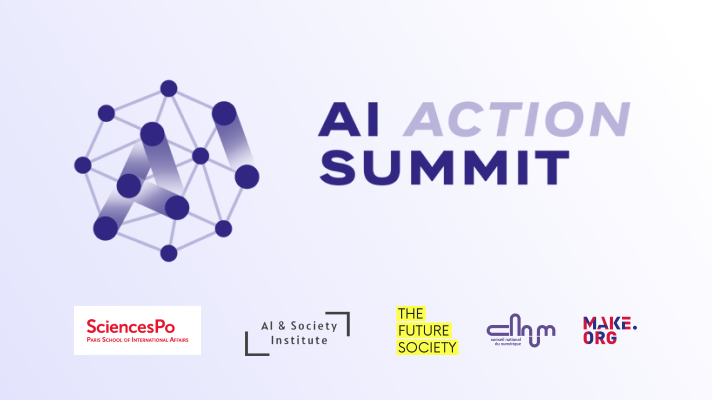This week, AI Now’s Co-Executive Directors, Amba Kak and Sarah Myers West, are in Paris participating in the AI Action Summit as delegates. Read their on the Summit below.
The Summit was intended to interrupt the wave of AI boosterism that has shaped the market over the past several years, pushing for a public interest vision for this technology. But the false urgency of the global AI arms race is poised to eclipse this vision, decentering the public in favor of narrow industry interests.
The terms of this race are being set outside the Summit, in closed door conversations between industry and the governments invariably acting to court them, rather than represent the interests of the public they are meant to represent.
A handful of AI firms dominate control of infrastructure and paths to market, and are best placed to cannibalize value across the AI supply chain. The spectre of the race artificially narrows our choices in ways that only concentrate power in a handful of tech firms and draws attention away from the very pressing question of what this technology is being used for: surveillance, control, and job replacement.
While we strongly support the French government’s efforts to catalyse an “affirmative vision” for building a decentralised and open public interest AI ecosystem, we are concerned that this effort will fail if it is not accompanied by an equally robust commitment to highlighting the major distortions in today’s AI market, which are rigged in favour of a few tech giants.
A truly public vision for AI will need to break open the debate on who gets to shape the future for this technology—given current conditions the seeds of a ground-up agenda for AI will germinate best outside the confines of the Summit rather than within the walls of the Palais.
Across the Summit, these themes have stood out:
Labor:
The promise of AI productivity gains dominates the mainstream agenda on AI and is premised on worker devaluation and displacement with most solutions focusing on reskilling and adaptation. Instead, we need true co-determination and to address the actual and increasing impacts of employers deploying AI to degrade job quality, increase economic precarity, and surveil workers. Workers and their representatives must have a decisive say in how, if at all, these systems are deployed and a share in how any productivity gains are distributed.
Climate:
While sustainability and biodiversity are key framing points for the Summit, too often this is interpreted through the lens of AI as a tool for sustainability, rather than contending with the clear reality that AI itself is straining our climate. Infrastructural development for AI must urgently be brought within the limit of what the planet can sustain—or we will enact damage we can never roll back.
Military:
The prominence of military AI across the Summit agenda is another signal of the takeover of AI race logics—fueling an uptick in the proliferation of still unreliable and unsafe AI tools in domains with serious national security implications, while enriching a lucrative defence contracting base.
This statement can be attributed to Co-ED’s of the AI Now Institute (Amba Kak & Sarah Myers West).
Research Areas
